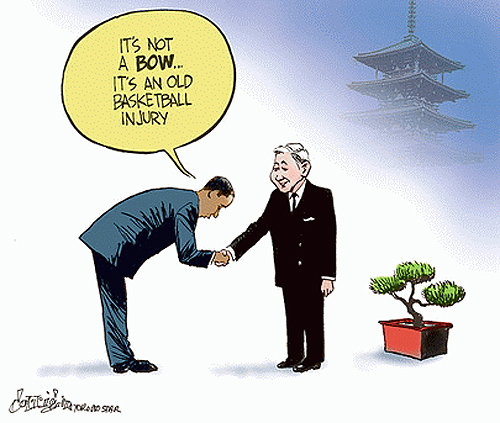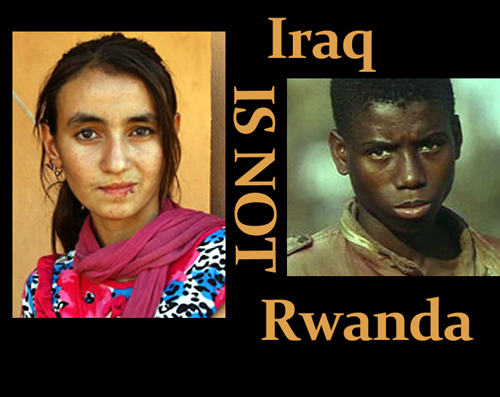 Erbil is not Rwanda.
Erbil is not Rwanda.
Supporters of the U.S. air attacks in northern Iraq spent the weekend invoking the mistake the U.S. made in 1994 in Rwanda as a reason why we should restart the military campaign in Iraq.
They obviously don’t know the history.
Prior to the Rwandan genocide, the United Nations Security Council empowered a peace-keeping force with boots on the ground from more than a dozen countries including a number of Rwanda’s African neighbors.
This had occurred after the French had unilaterally sent a small military force to Rwanda. France was the lead nation in the intervention force.
But the general overseeing the UN troops was Canadian. And the troops that saw most of the active engagement were Dutch. And literally dozens of other countries were involved in air lifts and logistical support.
And the entire world, as represented in the Security Council, was behind the effort.
Right now, there is absolutely no international effort to support Kurdistan (Erbil) or to help the stranded refugees in the Sinjar mountains. Right now it is only the United States.
In Rwanda the genocide followed when the French enlisted the United States in blocking increased UN military involvement by the Security Council even as the situation worsened. That was the mistake in Rwanda: choosing sides and letting one side start massacring the other.
In Iraq today a genocide may already have happened, and the stranded refugees in the Sinjar mountains could be the next genocide.
That’s the tough question, but it has an answer however horrible. If I believe a genocide is possible, am I saying the U.S. should not go it alone to stop it?
In this specific case, yes.
Based on the recent history of the area, the effort by us alone to change history, to abate even temporarily a genocide is likely to cost thousands more lives and infinitely more misery in the future.
The question to me is quite simple. Do we react to the horror of the present by damning the future to an even more horrific destiny? Can we not refer to history?
Can we not stop rewriting history, as with the analogies to Rwanda?
This is not isolationism. If what is happening in the Sinjar mountains were happening in Puerto Vallarta then my orientation would change. If other countries in the Mideast and nearby Europe asked us for support, my support is available.
But to go it alone? No. Definitively and completely. Not only must Americans grow their sense of community, they must extend their human vision into the future and realize as nature’s greatest achievement we have the capability to fashion our future, not just react to our present like unintelligent animals.
A final subtle argument floating around the weekend talk shows was that yes, we were wrong to go into Iraq, but we did so, so we are now responsible for the mess we created.
Yes, we are completely responsible for the mess we created. So do we create a greater mess? The only responsible thing to do is stand back and let the area’s own social and historical equilibriums reappear however awful that may be.
We can’t fix it. We were unable to fix it in the beginning, and now we are unable to fix the mess we created. All we are capable of doing is making bad situations even more terrible.
Virtually every conflict that America has gone alone in my life time has been a disaster, starting with Vietnam. The world today would be so much better and happier if America had not blustered solo into those wars.
We shouldn’t feel unmasculine recognizing this fact. Power is never insurmountable, not even moral power. From my point of view, the only global power that will prevai is GLOBAL power, the combined efforts of multiple countries. We supply the warplanes. Sweden or Chile supplies the justification.
The conflicts in which we were only a part – like the Balkans War – had very good outcomes.
We are strong and should remain so. But we are dumb and should listen to the rest of the world before throwing our punches.
 Populism is not some lonesome social condition. Populism controls democracy, and populism brings down and sets up autocratic regimes. It’s not conservative or progressive, capitalist or communist. It’s not necessarily based on truth. It’s knee-jerk support for – or against – individuals wielding power. Why? How is it harnessed?
Populism is not some lonesome social condition. Populism controls democracy, and populism brings down and sets up autocratic regimes. It’s not conservative or progressive, capitalist or communist. It’s not necessarily based on truth. It’s knee-jerk support for – or against – individuals wielding power. Why? How is it harnessed? Sometimes good acts prevail even after evil-doers reverse them:
Sometimes good acts prevail even after evil-doers reverse them: Africa as my lifeway’s platform for roughly 5 months annually during the troubled times of the last few years has radically changed my view of democracy.
Africa as my lifeway’s platform for roughly 5 months annually during the troubled times of the last few years has radically changed my view of democracy.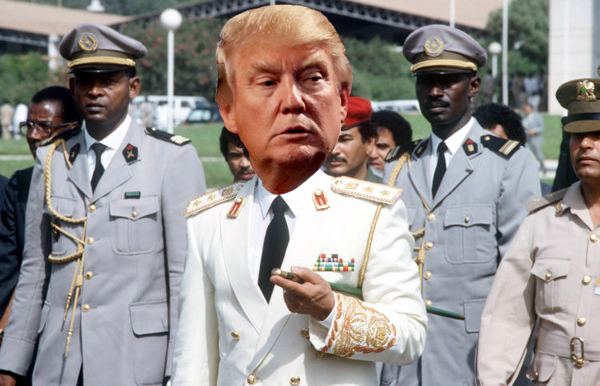 Many Africans view 2018 positively, a time when autocratic leaders solidified power and stability increased. For many African conservatives it was a good year.
Many Africans view 2018 positively, a time when autocratic leaders solidified power and stability increased. For many African conservatives it was a good year. Last week Rwanda, one of the smallest countries in the world,
Last week Rwanda, one of the smallest countries in the world,  Good question. Where is that fellow in the picture? Well, he’s in a highland rain forest with a mountain gorilla. There’s only one highland rain forest in the world with mountain gorillas. But the country he’s in isn’t so clear: Rwanda, the DRC or Uganda?
Good question. Where is that fellow in the picture? Well, he’s in a highland rain forest with a mountain gorilla. There’s only one highland rain forest in the world with mountain gorillas. But the country he’s in isn’t so clear: Rwanda, the DRC or Uganda? There are three countries in the world where you can sit down with a mountain gorilla (gorilla beringei beringei) for an hour of very unique animal viewing: Rwanda, Uganda and the DRC. This is because this gorilla’s single habitat area overlays the point where these countries border one another.
There are three countries in the world where you can sit down with a mountain gorilla (gorilla beringei beringei) for an hour of very unique animal viewing: Rwanda, Uganda and the DRC. This is because this gorilla’s single habitat area overlays the point where these countries border one another.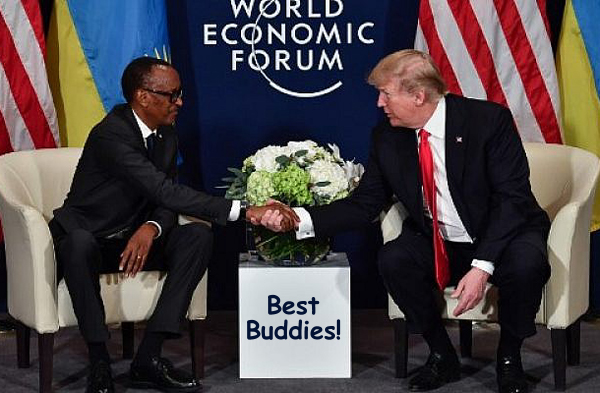 You might not have noticed the cheering but there are some serious praises coming out of Africa for Trumpism.
You might not have noticed the cheering but there are some serious praises coming out of Africa for Trumpism. Jokes and derision poked at Americans limited understandings of far-away places like Africa seemed to diminish over the last few years. I guess not.
Jokes and derision poked at Americans limited understandings of far-away places like Africa seemed to diminish over the last few years. I guess not. Only the rich can see wild animals. That’s the message – indeed, the policy – of Rwanda’s decision over the weekend to
Only the rich can see wild animals. That’s the message – indeed, the policy – of Rwanda’s decision over the weekend to  Unending protests continue in Ethiopia, South Africa and Zimbabwe, and though unique issues power each country’s turmoil, the fundamental driver is economic.
Unending protests continue in Ethiopia, South Africa and Zimbabwe, and though unique issues power each country’s turmoil, the fundamental driver is economic. Every country wants an airline, its own airline, and how that airline works characterizes the country as a whole.
Every country wants an airline, its own airline, and how that airline works characterizes the country as a whole.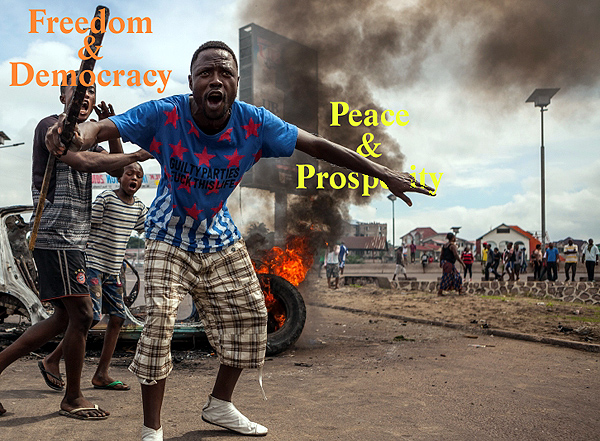 Throughout most of the continent today, Africans confront a horrible choice: Peace & Prosperity… or Freedom & Democracy. Seventeen
Throughout most of the continent today, Africans confront a horrible choice: Peace & Prosperity… or Freedom & Democracy. Seventeen 
